Year 6
Insects Inspired by Leonardo Da Vinci
Ancient Egyptians Canopic Jars
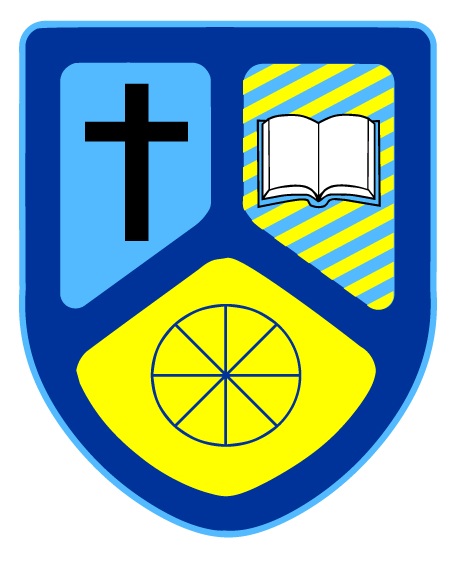
Subject Leader- Miss L Bell
Intent:
The intention of the Art curriculum at Edward Peake is to produce creative work, exploring their ideas and recording their experiences to become proficient in drawing, painting, sculpture and other art, craft and design. The curriculum has been designed to be aspirational for all pupils, providing support and challenge to meet the needs of learners. Pupils are able to explore periods of art and artists, for them to create and explore using a variety of materials whilst learning new techniques and knowledge. We encourage independent learners by analysing their work to make informed choices and decisions in their artwork. The Art curriculum has been specifically designed to meet the needs of all pupils regardless of their previous experiences or potential barriers to learning. Pupils are exposed to a range of artists from different cultures, backgrounds and ethnicities in order to develop their cultural awareness. We make use of subject specialist teaching across all 4 year groups, with a specialist art room and resources.
Our main aims are to:
There are 3 key concepts which are threaded throughout the Art Curriculum at Edward Peake. These are:
Personal expression, being able to discuss and share opinions confidently about their art and the art of others. Creative expression, where pupils are able to take risks with their own art work and challenge their skills. Design and application to use mediums, media and processes correctly and confidently in their work.
Implementation:
Pupils are encouraged to broaden and deepen knowledge of Art whilst showing a positive attitude to learning. The intent is implemented in Art through a series of research, explore, analyse and create.
| Live: Ensure pupils develop skills and personal qualities for lifelong learning so that they can make an active contribution to society and the arts community. |
Love: Broaden pupils’ horizons by giving them opportunities to explore different materials, skills and artists. |
Learn: Develop independent, confident and successful art and crafters and encourage their creative thinking. |
|
| In the classroom | Introduction to artists and or movements linked to the topic. Exploring emotions, values and understanding of our movements and artists lives. | Choosing their own challenges in the classroom to further their art skills. Exploring different materials, mediums and styles throughout their work. | To discuss artists, expressing opinions and make links to their practical work. Learn how to adapt and refine their work. |
| Out of the classroom |
Close links with feeder lower schools and upper schools Visits from artists who are members of the wider community. |
Extra-curricular clubs Community events Competitions |
Access to online resources, google classroom with Intervention strategies and support |
Impact:
Pupils achieve academically, are ready for their next steps in education and have high aspirations for their future.
| Live: Ensure pupils develop skills and personal qualities for lifelong learning so that they can make an active contribution to society and the arts community. | Love: Broaden pupils’ horizons by giving them opportunities to explore different materials, skills and artists. | Learn: Develop independent, confident and successful art and crafters and encourage their creative thinking. | |
|
Pupils are prepared by having discussions and able to share opinions with their peers. KS3 pupils’ drawing skills are at a level prepared for upper |
Pupils have high aspirations for their future. Pupils are prepared for the wider world and key artists and movements. Pupils understand other people’s lives, places and artists from all over the world. |
Pupils make good progress and are able to achieve academic success Disadvantaged pupils are supported in order to close the gap between themselves and their peers. |
Head of Science – Mrs G.Gunter
Science Technician – Mr A.Grainger
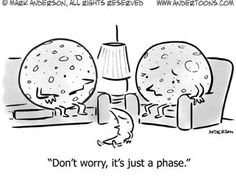
The school follows the RE Agreed Syllabus for Bedford Borough, Central Bedfordshire and Luton 2012-2017.
RE is learning about the religions of the world and learning from them. The religions studied and discussed at Edward Peake are Hinduism, Islam, Sikhism, Judaism, Humanism and of course, Christianity. We also delve into the areas of agnosticsm and atheism and why people think in different ways about God and the world.
In Keystage 3, you will be able to discuss some moral and theological questions, such as ‘Who made my jeans?’ and ‘What do people say about God and the Universe?’
The approach to lessons in RE is varied and includes discussion, drama, artwork, sorting games, presentations, posters and speeches, just to name a few. We try out the practical elements of worship in different faiths, such as wudu. Visits to places of worship and by visiting speakers will be arranged to link in with topics in each year group.
We don’t have all the answers in RE lessons, but you are given the opportunity to find out for yourself what the world is about and discuss those burning questions like ‘Why am I here?’ and ‘What’s wrong with the world?
Key Stage 2 Key Stage 3 Pictures Levels in RE
Head of PSHCE department – Miss D Hooper
[gview file=”https://cdn.realsmart.co.uk/edwardpeake.realsmartcloud.com/uploads/2017/07/What-is-PSHCE-.pptx”]
Subject Leader – Miss K Goodwin
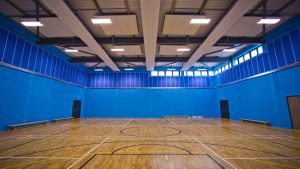
Here at Edward Peake C of E (VC) School, we aim to provide a broad and balanced P.E. curriculum which enables pupils to experience and enjoy a wide range of sporting activities.
Developing pupil’s positive attitude towards physical activity is central to the P.E. department’s aims, as is encouraging pupils to participate in our extensive programme of extra-curricular sporting opportunities and prepare them for lifelong participation.
We believe that sport and physical activity is an invaluable tool to help pupils reach their full potential. We not only help pupils develop their physical literacy skills; we also strive to help pupils develop essential life skills through team work and competitive play.
Intent:
The intention of the PE curriculum is to teach our children the positive impacts being active has on their social, metal and physical wellbeing. We aim to deliver high-quality teaching and learning opportunities that inspire all children to succeed in physical activities. To support this, we have an in-depth curriculum plan which aims to provide students with access to a range of activities but to also prepare students for our GCSE programme in KS4. Some of the sports students will participate in are: Football, Netball, Cricket, Rounders, Handball, OAA, Health Related Fitness, Softball, Basketball to name a few. Students will have a focus for each year they are with us allowing students to learn how to complete skills, understand the decision- making process and tactics behind skills as well as become leaders within their lessons. We offer an enriched sports leaders programme that allows our pupils to explore leadership qualities in their chosen area of interest, Thus, allowing pupils who participate in extracurricular activities the opportunity to gain experience in leadership. Physical education promotes an understanding in children of their bodies in action. It involves thinking, selecting and applying skills and promotes positive attitudes towards a healthy lifestyle.
This is delivered through a golden thread approach, with key concepts running throughout each year’s group curriculum. These key concepts are skill development, active thinkers, sports leadership. This enables children to make informed choices about physical activities throughout their lives.
Our main aims are to:
Pupils will have the opportunity to experience a balanced and varied curriculum allowing pupils to participate in a wide variety of activities covering invasion, racket, striking and fielding, aesthetics and athletics. They will also use technical terminology with confidence accurately and precisely, building up an extended specialist vocabulary.
Pupils have the opportunity to attend extra-curricular sporting clubs and competitions to represent their school and community. Our curriculum helps pupils to make positive informed choices around their health, well-being and diet. It is important to us that all pupils, no matter their current sporting ability or involvement in sporting groups have the opportunity to develop their full potential.
Our curriculum also aims to develop pupils’ cultural awareness by having a sound understanding of different sports, their origins, including British and world-wide sporting role models.
Implementation:
Pupils are encouraged to broaden and deepen knowledge of PE whilst showing a positive attitude to learning. The intent is implemented in PE through a series of performance, knowledge and theory, leadership and physical health/fitness preparation. We make full use of extensive outside space, sports hall and fitness facilities to implement our curriculum, allowing pupils to experience a wide range of sporting activities. Pupils are also encouraged to take on leadership roles, supporting other pupils through demonstrations, refereeing and coaching.
The PE curriculum follows the Edward Peake lesson structure, which allows pupils to see a clear demonstration and modelling before applying this knowledge to their own practice. Through reflection, pupils are encouraged to identify strengths and areas for improvement.
All pupils receive two hours of PE every week. In KS2 and KS3 pupils are taught by subject specialist PE teachers.
|
Live: Broaden pupil choices around their social, physical, mental wellbeing. |
Love: Encourage passionate, engaged and enthusiastic students. |
Learn: Develop independent, confident and successful learners who engage with the full PE curriculum |
|
| In the classroom | Live the feelings, emotions and understanding of our movements and lives. Understanding the impacts of exercise on their bodies both physically and mentally. |
The process of learning new skills, to experiment and to challenge. Studying a variety of sports with the focus on physical and mental health benefits. Experiencing tactics and strategies through a series of conditions and competitive situations. |
To discuss, analyse and make their own decisions. Develop understanding that will allow students to lead a healthy active lifestyle both now and in the future. With a broader knowledge and understanding of the mental and physical benefits to exercise. |
| Out of the classroom | Close links with feeder schools and local secondary schools. Close links to the wider community clubs and promote site facilities for outside clubs to use to engage more pupils. | Having the opportunity to attend extra-curricular activities and represent the school. Celebrating successes and managing the challenges of defeat. |
Access to online resources, local fitness centres. Access to outside clubs which will help build leadership through sport, thus developing self-esteem, confidence and resilience. |
Impact:
Pupils achieve academically, are ready for their next steps in education and have high aspirations for their future.
|
Live: Broaden pupil choices around their social, physical, mental wellbeing. |
Love: Encourage passionate, engaged and enthusiastic students. |
Learn: Develop independent, confident and successful learners who engage with the full PE curriculum |
|
Pupils are prepared to move from one year group to the next. KS3 pupils’ subject knowledge and health understanding are suitable for accessing GCSE curriculum. |
Pupils have high aspirations for their future. Pupils are prepared for the wider world Pupils understand other people’s physical abilities, social differences and challenges |
Pupils attain broadly in line with national averages, given their starting points. Progress across the four years is at least good and transferable across a range of sports. |
Head of Music Department – Mrs S Thorn
Aims
The national curriculum for music aims to ensure that all pupils:
Year 5 Year 6 Year 7 Year 8 Extra Curricular Instrumental Lessons Gallery
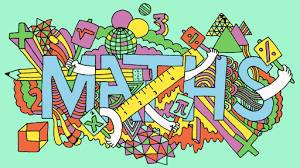
“Encourage each other and build each other up” (Thessalonians 5:11)
Intent:
The intention of the mathematics curriculum is to provide all pupils with the depth of knowledge and mathematical skills to be able to solve new problems in unfamiliar situations. Pupils will be able to apply the techniques and skills learnt in mathematics lessons to their mathematical studies, all areas of the curriculum and everyday life.
Our main aims are to:
Implementation:
Pupils are encouraged to broaden and deepen knowledge whilst showing a positive attitude to learning. The intent is implemented through the structure and progressive learning within mathematics lessons and working together as a community with the support of students, parents, businesses and other schools to provide opportunities for learning.
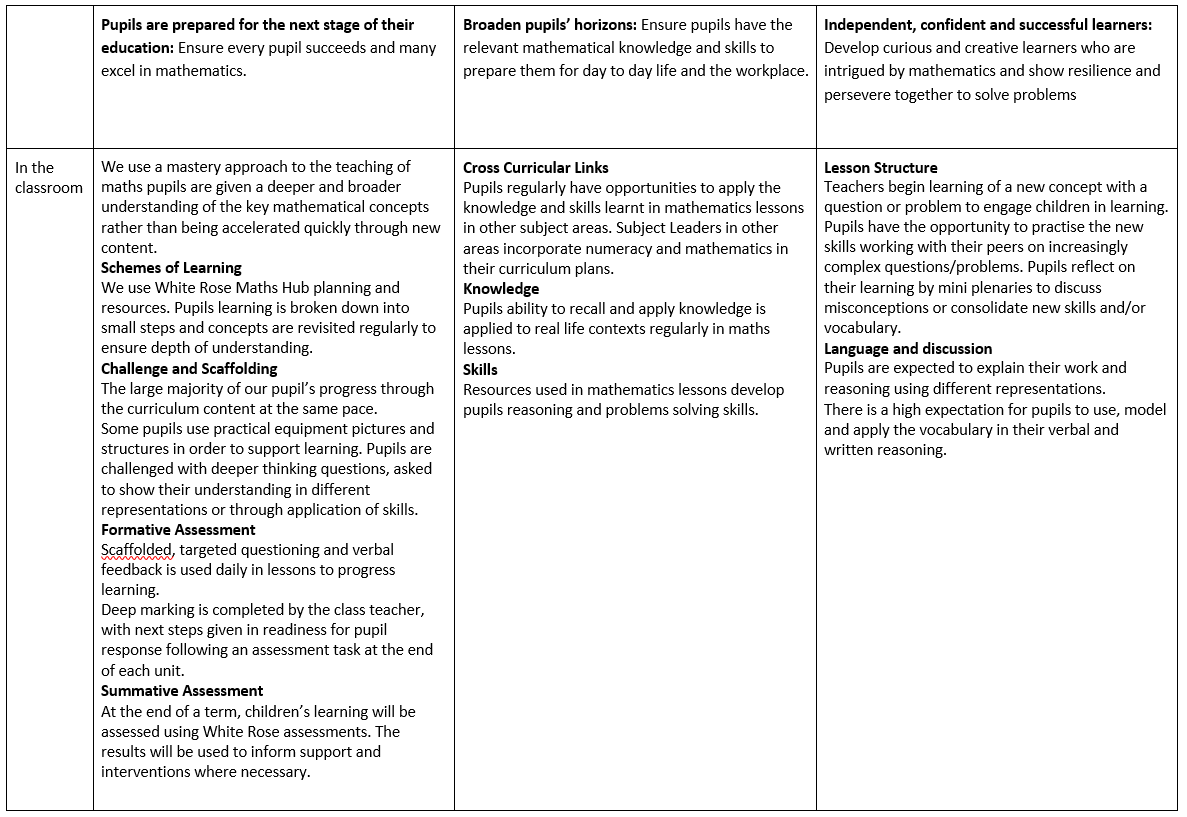
 Impact:
Impact:
Pupils achieve academically, are ready for their next steps in education and have high aspirations for their future.
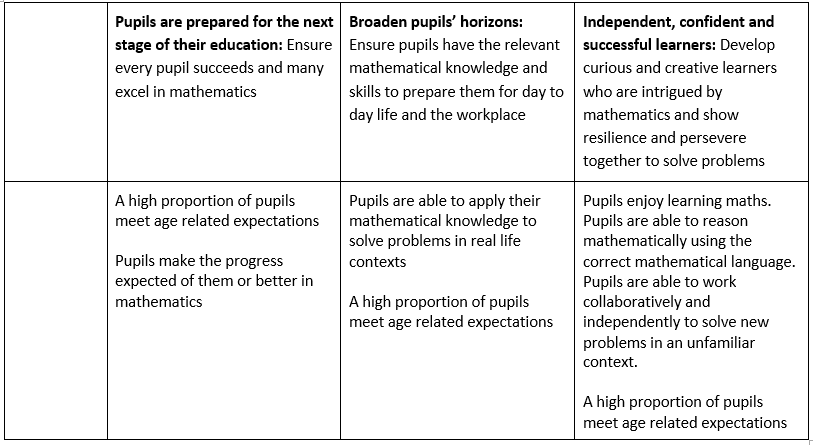
Subject Leader: Mrs C Mwamatandala
“If you talk to a man in a language he understands, that goes to his head. If you talk to him in his language, that goes to his heart.” (Nelson Mandela)
Learn a language and become a truly global citizen. Knowing another language will improve your job prospects and your earning capacity.
Learning a language does not just enable us to improve our communication skills, it also gives us a way of understanding different perspectives and the way different cultures see the world! A good language learner is curious, inquisitive, open-minded, tolerant and confident. Learning a language is one of life’s great adventures!
Being able to understand and communicate in another language enhances your working memory and your knowledge of your own language. It improves creativity and problem-solving skills. Learning a language is fun and fascinating and it can change your life for the better!
Intent:
The intention of our curriculum is to provide a broad, balanced and knowledge rich language education which ensures every child is offered challenging and engaging learning experiences with Christian values at their heart. Through our four key concepts in languages (linguistic competence, knowledge about language, creativity and cultural diversity), we aim to produce a rounded curriculum that is accessible to all learners and creates a solid foundation for future study/use for real purposes in both a personal and professional context.
Our main aims are to:
Implementation:
Through the four main concepts that we develop in MFL at Edward Peake, we aim to maximise linguistic competence and confidence as well as knowledge about language and cultural diversity. At key stage two, pupils study a language for one hour a week. This increases to two hours per week at key stage 3. We use the latest e-based teaching resource (Dynamo) which links directly to the national curriculum and to the Edexcel GCSE course, and which assesses against standards that prepare our pupils for the next stage of learning. We supplement our learning by using resources such as Quizlet, Linguascope, À tantôt, Blooket and Kahoot as part of a media rich broad French curriculum. This enables all pupils to access the curriculum in a varied and engaging manner. Cultural diversity is important to us here at Edward Peake so, as part of the French curriculum, we look at all of the French and German speaking world and its cultures rather than focusing on one specific country. Language learning in the classroom is enhanced by an annual trip to Europe so that pupils can practise a variety of language skills and experience the culture first-hand.
|
Live: Foster curiosity and developing language skills through spoken and written expression. Enable pupils to express their ideas and thoughts in a modern foreign language and to understand and respond to its speakers, both in speech and writing. |
Love: Learn new ways of thinking and develop an appreciation of other cultures and customs |
Learn: Provide the foundation for learning further languages therefore equipping pupils to study and work in other countries. Develop the skills and confidence of language learners to consider themselves as ‘World Citizens’ who belong in a multicultural, mutually respectful world. |
|
| In the classroom | Through sequenced learning using up to date resources, pupils will understand and respond to spoken and written language from a variety of authentic sources and speak with confidence, fluency and spontaneity. | We aim to support pupils to understand other countries and cultures so that they can be more open and adaptable to new experiences; ensuring that each topic contains an element of cultural reference to not only individual countries but the wider world. | Quality first teaching, challenging activities and subject specialist teaching. The department is committed to developing strong, lifelong linguistic skills and to encourage students to become curious and interested in the world. |
| Out of the classroom |
Appropriate and challenging home learning tasks for pupils using online and traditional resources. Intervention strategies and support. We endeavour to inspire all language practitioners/peers through collaboration, support and modelling exceptional practice. |
Annual residential trip to Europe. Accessing cultural based media to visit the wider world. |
Appropriate and challenging home learning. Access to online resources. Intervention strategies and support. We endeavour to inspire all language practitioners/peers through collaboration, support and modelling exceptional practice- no matter what stage of career journey. |
Impact:
Pupils achieve academically, are ready for their next steps in education and have high aspirations for their future. Students have an enjoyable, positive and meaningful language-learning experience which enables them to appreciate the benefits of knowing another language other than their own and to feel confident and excited about learning and using a foreign language in and beyond the classroom. Through our delivery of high-quality subject-specialist teaching and cultural insight, we will nurture students and promote a linguistic curiosity and the intrinsic motivation to explore and respect other cultures and people.
|
Live: Foster curiosity and developing language skills through spoken and written expression. Enable pupils to express their ideas and thoughts in another language and to understand and respond to its speakers, both in speech and writing. |
Love: Learn new ways of thinking and read great literature in another language. |
Learn: Provide the foundation for learning further languages therefore equipping pupils to study and work in other countries. Develop the skills and confidence of language learners to consider themselves as ‘World Citizens’ who belong in a multicultural, mutually respectful world. |
| Pupils find ways of communicating what they want to say, including through discussion and asking questions and continually improving the accuracy of their pronunciation and intonation; can write at varying length, for different purposes and audiences using the variety of grammatical structures that they have learnt. |
Pupils have higher, more informed aspirations for their future. Pupils are prepared for the wider world both academically and vocationally. Pupils extend their cultural capital. Pupils will have an appreciation of how other cultures live life and as a result will be more willing world citizens. |
Pupils will discover new ways of looking at situations and apply cultural awareness to their decision making. Learning a language will enhance learning in other areas and increase opportunities for cross-curricular collaboration. Pupils will feel accomplished when they can talk confidently and with knowledge about another culture and its customs. |